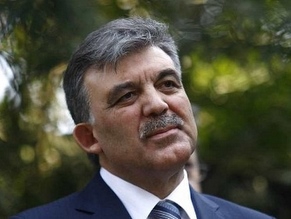|
World Jewish News

Turkish President Abdullah Gul during a press conference in Cairo, Egypt, March 3, 2011. Photo by: AP
|
Turkey: Israel-Palestinian peace will decide fate of Arab uprisings
21.04.2011, Israel and the World Turkish President Abdullah Gul said in a New York Times editorial Thursday, that the fate of the Arab world uprisings will be determined by whether there is peace between Israel and the Palestinians.
"Whether these uprisings lead to democracy and peace or to tyranny and conflict will depend on forging a lasting Israeli-Palestinian peace agreement and a broader Israeli-Arab peace," Gul said in the article.
The Turkish President said that Israel, more than any country, needs to adapt to the new political climate of the region. "But it need not fear," he said, "the emergence of a democratic neighborhood around Israel is the ultimate assurance of the country’s security."
Gul said that in the coming 50 years there will be an overwhelming majority of Arabs in the combined regions of Israel and the existing Palestinian territories, comprised of a generation of pro-democratic Arabs. As such, he said, "sticking to the unsustainable status quo will only place Israel in greater danger."
The New York Times editorial said that the plight of the Palestinians has been a cause of unrest and conflict in the region and a pretext for extremism in other parts of the world. "Israel cannot afford to be perceived as an apartheid island surrounded by an Arab sea of anger and hostility," said the Turkish president.
The article added that a dignified Palestine, living side by side with Israel, will fortify Israel's security, and that Turkey will benefit from a peaceful Middle East. "We are therefore ready to use our full capacity to facilitate constructive negotiations."
Israel's relationship with Turkey, once a key Mideast ally, has severely deteriorated since the Gaza war of the winter of 2008-2009, after which Ankara had severely criticized Jerusalem for use of excessive force in a dense civilian population.
The ties between the once stanch allies continued to worsen following Israel's raid on a Turkish Gaza aid flotilla in May of 2010, which resulted in the deaths of nine Turkish activists.
Turkey has repeatedly urged Israel to apologize for its boarding of the Gaza flotilla, demanding that it compensate the families of those injured and killed in the incident, demands that were rejected by Israel.
Recently, Turkish officials indicated they rejected a request from Israel to help stop activists sailing to Gaza on the first anniversary of an Israeli raid on a Turkish ship, saying flotilla plan was not Ankara's concern.
The Free Gaza Movement, a pro-Palestinian activist umbrella group, has said that a flotilla expected in late May would comprise 15 ships with international passengers including Europeans and Americans.
Israel's ambassador to Turkey, Gaby Levy, asked the Turkish government this week to help stop the activists, saying sending humanitarian aide to Gaza outside legal channels was a "provocation," an Israeli diplomatic official told Reuters.
Asked about the request, a Turkish foreign ministry official told Reuters: "We listened to the message given by the Israeli side and told them this is an initiative by civil society."
Haaretz.com
|
|
